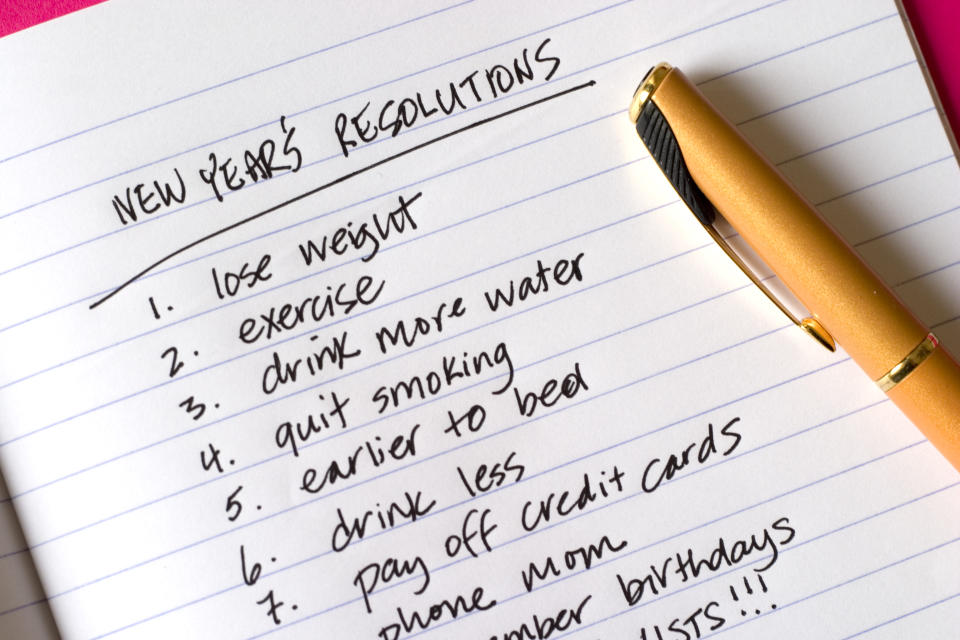Why most New Year's resolutions fail, and how you can actually succeed
With the new year comes the onslaught of inspired social media posts about New Year’s resolutions. Many people are promising that 2020 is the year they will lose weight, eat more vegetables, save more money, and spend more time with the people they care about.

But despite those good intentions, it’s common knowledge that most people are destined to fail. Research has found that January 17 is generally the day most people give up on their resolutions, meaning you’ve got a couple more weeks before you’re destined to join those who have scrapped their resolution for another year.
So why do we make New Year’s resolutions, anyway? The origin of the practice dates back to the Babylonians 4,000 years ago, who believed that they would earn favour with the gods if they made promises to improve themselves, such as getting out of debt. The practice has managed to carry on through the centuries, and is still practised by many today.
Why New Year’s resolutions are good for you
Psychologists believe that starting with a clean slate is appealing to many people. The fresh start that a new year brings is often motivation for people to change their habits for the better.
Making resolutions can actually improve your brain health, too. A study by European business school INSEAD found that having a modest goal to work towards, like an easy New Year’s resolution, was actually healthier for you mentally than just maintaining the status quo. People felt better about themselves if they set out to improve in some way, but became disheartened if they didn’t resolve to be better, especially if they had experienced failures in the past and only expected the same of themselves.
There’s also proof that even if you don’t attain your goal, a New Year’s resolution can still help you improve. People who make New Year’s resolutions are 10 times more likely to make a positive change after six months compared to those who make no resolution at all, according to Psychology Today.
Why New Year’s resolutions fail
Despite having good intentions, however, many who make resolutions still find themselves struggling. A study from the University of Scranton followed 200 people who made New Year’s resolutions for two years, and found that only 19 per cent were able to keep their resolution after that two-year period.
There are a few main reasons for that:
No immediate reward: A study that compares delayed rewards with immediate ones found that if people couldn’t see an immediate payoff, they were less likely to succeed.
Goals that are too big: If you set out to make too big a change at once, like intending to go to the gym for an hour every day, you’re more likely to lose interest than if you make a small, incremental change to your lifestyle.
Going solo: Accountability plays a major role in how likely someone is to succeed. A 2012 study from Leeds University found that people who worked with a partner to improve their diet and exercise were more likely to stick with it compared to those who tried to make those changes on their own. Even if your goal is something that you have to do on your own, other studies show that telling someone else what your goal is helps to keep you accountable.
Decisions made in a high emotional state: When we make our New Year’s resolutions, it’s often when we’re caught up in the promise of a new year, that fresh start, which serves as great motivation to get started. However when that emotional high wears off, it can become difficult to find the motivation to continue making the change we set out to make.
How to keep your New Year’s resolution
Several studies have found different methods work for different people, but all of them are based around similar principles. Those who keep their goals reasonable and attainable, and determine incremental rewards for their success, are more likely to keep with their plan. It also helps to avoid situations where you know you’ll be exposed to the behaviour you’re trying to correct, like avoiding buffets if you’re trying to stop over-eating.
For goal-setters who want a more concrete plan, a new study from the Ottawa Hospital Research Institute is proposing a “brain hack” that could help people make better choices. Justin Presseau, a scientist at the Ottawa Hospital Research Institute, told The Globe and Mail that “implementation intentions” have seen some success in helping people improve their habits through “if/then” plans.
For example, if you know you’re going to be offered a beer at a friend’s birthday, you can make the plan “if I’m offered a beer by a friend, I’m going to order a Sprite instead.” The systemic review recently completed by Presseau and his team found that when groups were instructed to make these plans, there was an increase in those who made healthier or better choices.
If you’re still feeling motivated to make a New Year’s resolution, these are predicted to be the most popular resolutions for 2020, based on the artificial intelligence algorithm Polly:
1. Actually doing my New Year's resolution
2. Trying something new
3. Eat more of my favourite foods
4. Lose weight/diet
5. Go to the gym
6. Be happier/better mental health
7. Be more healthy
8. Be a better person
9. Upgrade my technology
10. Staying motivated

 Yahoo Sport
Yahoo Sport 






































